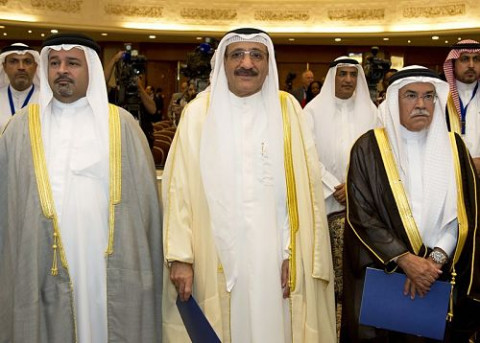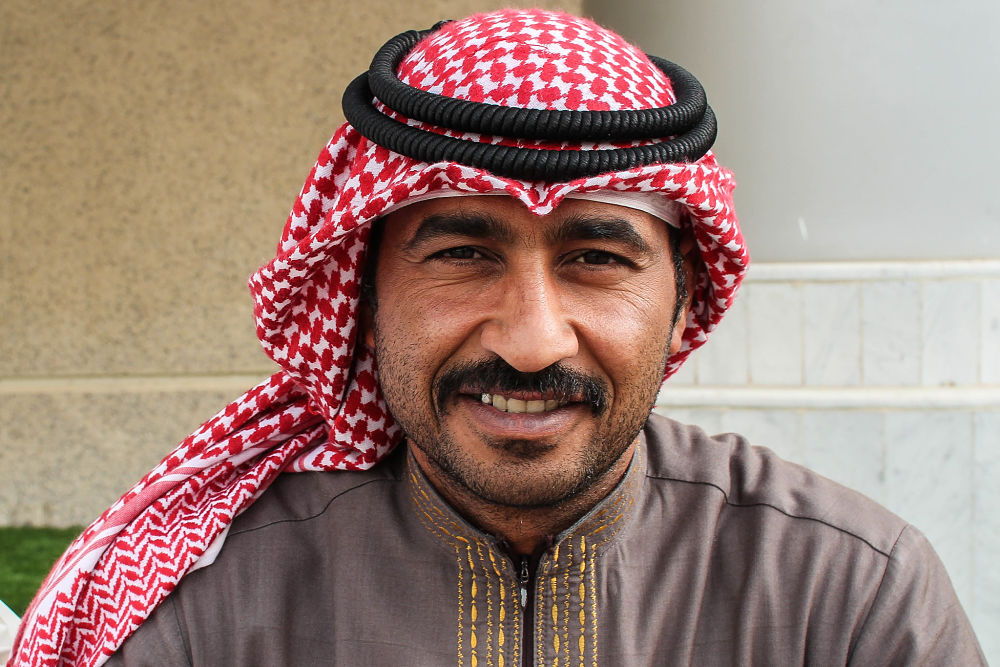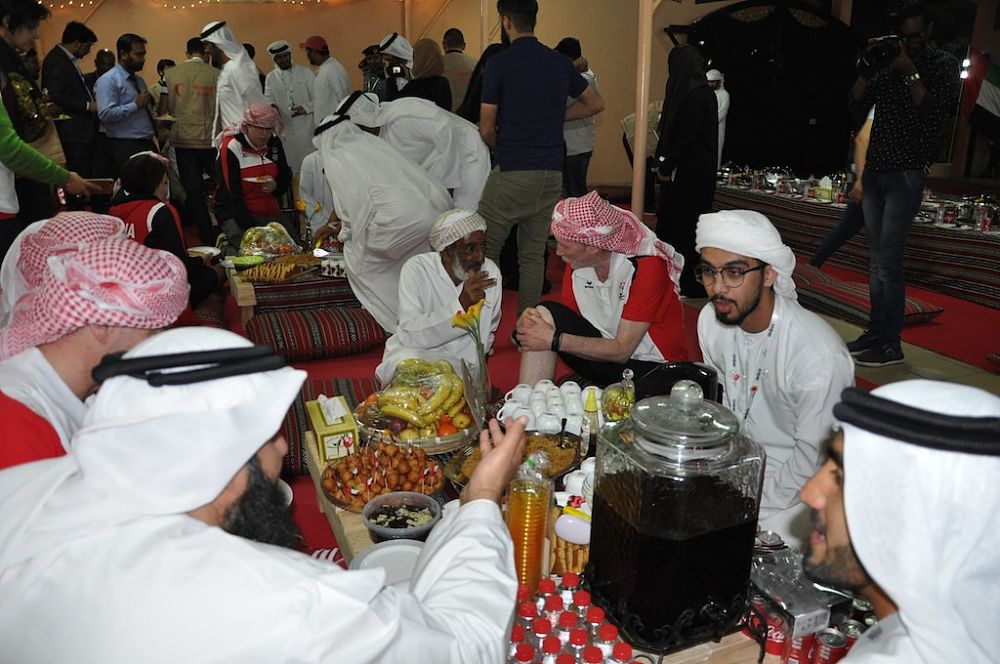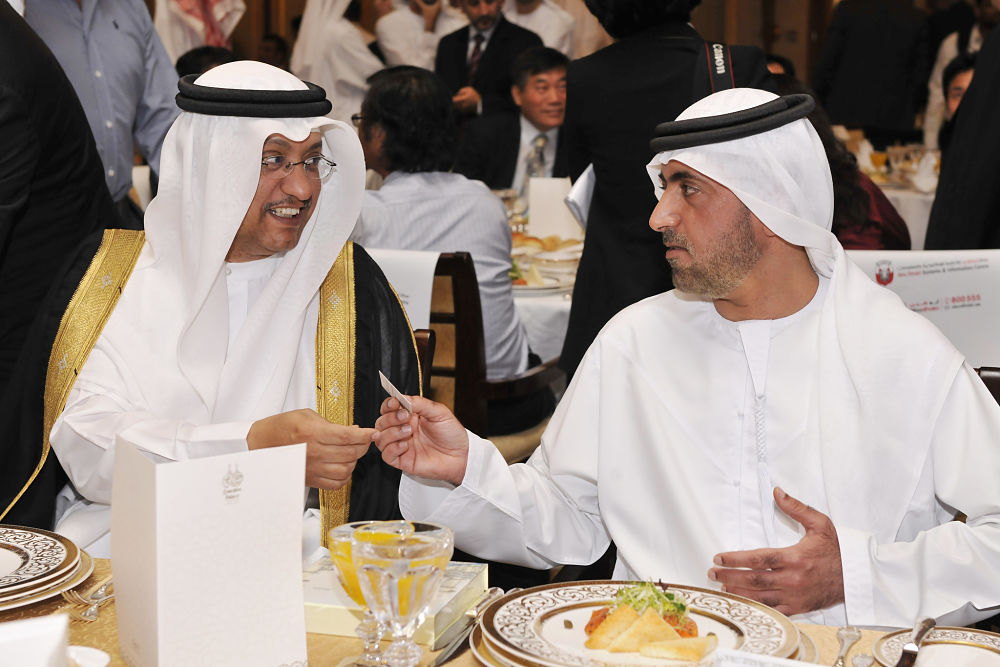The Importance of Business Relationships in the Middle East
Doing business in the Middle East or Arab world?
Then you really need to take some time out and read this article!
If you want to make a positive impression in the region, you need to understand local expectations.
For many, the Middle East culture can be alien, so we're going to help you understand why relationship buiding is integral to success in the region.
Firstly, we'll discuss why cultural awareness is so important for professionals working in the region before looking at some specifics around relationship building.
DON'T MISS THE FREE SAMPLE OF OUR MIDDLE EAST CULTURE COURSE AT THE END!
Why is Cultural Awareness Needed in the Middle East?
Cultural awareness training is sometimes perceived as a luxury within the business world.
Many who feel this way are also proponents of the misconception that because the "world is getting smaller" our differences are becoming less obvious and less of a problem.
This is in fact false. As we get closer, our differences become more acute and more of a problem thus further driving the need for cultural awareness training.
Companies are now tuning into the fact that in order to get ahead in today's global economy, cultural awareness is critical.
It is no longer a luxury but a necessity.
Did you hear about the expat manager in Iraq who caused a riot due to his lack of cultural awareness? Read about that here if you like.
The right cultural awareness training can offer a company real benefits, namely a competitive advantage and a greater long term gain.
Why is Culture Important?
When intercultural trainers explain 'culture', many use the iceberg model. Simply stated in everyday interaction we see only the surface level of culture, i.e. art, books, film, food, fashion and language.
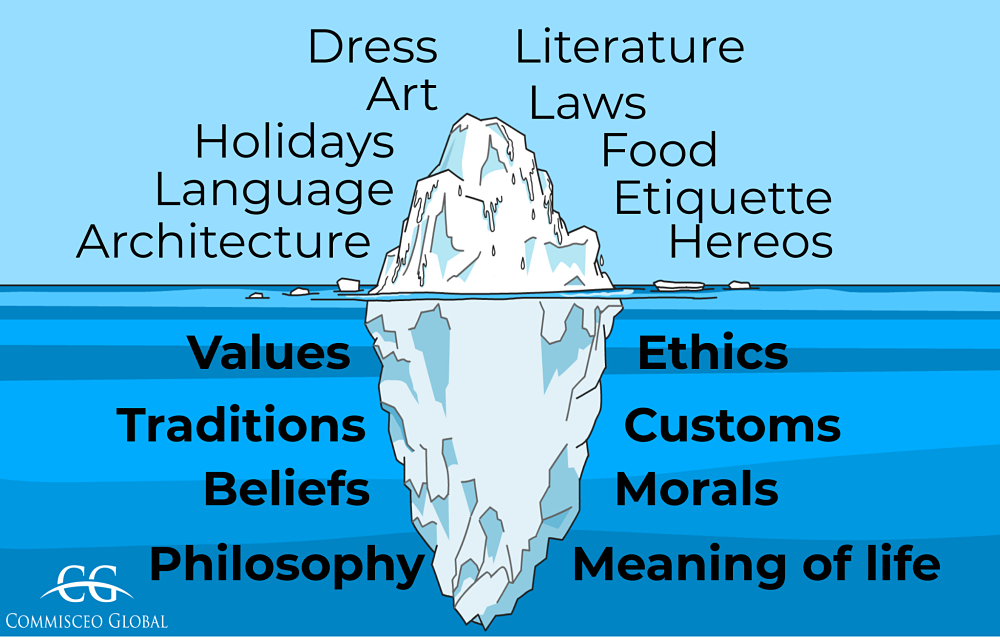
On the whole these are very unlikely to cause any great problems in the business world. It is the underbelly of the cultural iceberg that poses the problems.
These are areas such as attitudes, beliefs, assumptions, world views, communication styles and values. If people are unaware of such differences when it comes to such fundamentals, the potential for misunderstandings, poor communication and failed relationships are increased.
Cultural awareness training provides people with an insight into those very differences and provides strategies to help overcome potential obstacles.
One of these obstacles when thinking about the Middle East is the approach to relationships in business.
The Diversity of Cultures in Middle East
Before discussing the Middle East as a region it is important to bear two things in mind.

Kurdish man from Erbil, Iraq. Photo by Levi Meir Clancy on Unsplash
1. Firstly, the Middle East is not a homogenous region.
The area is not solely populated by Arabs but also Kurds, Turks, Iranians and more. In addition it not only inhabited by Muslims. There are many manifestations of Islam across the region that live alongside Christianity, Judaism and Zoroastrianism. For simplicity I will primarily focus on Arabs.
2. Secondly, please note that the article will be making generalisations about the Middle East.
Generalisations are observations made by outsiders on a region about a culture or society. These of course do not bear in mind individual differences. For example, I can make the generalisation that women in the Middle East do not shake hands with men, but there will always be exceptions to the rule.
We use generalisations in cultural awareness training as it acts as a useful safety net, meaning if someone goes to the region and knows nothing about it they can fall back on the generalisations made until they start to figure things out for themselves.
Relationship Driven Cultures
The Middle East is what we would call in intercultural jargon a "relationship driven culture", i.e. personal relationships form the basis of social (and business ) interaction. Relationship driven cultures usually have the following traits.
If you're going to be working with Arabs, you have to learn about 'face'. Click here to learn more.
Photo of Kuwaiti man by 9kurt on Flickr (CC BY 2.0)
Common Traits in Relationship Driven Cultures
1. Collectivist - this means that in such cultures the "we" takes precedence over the "I". This group mentality means the interests, opinions and decisions of the group carry much more weight than that of the individual.
2. The Family - the family or tribe takes central focus in daily life. In such cultures very tight relationships are built with a small group of people whereas in more individual cultures people tend to have loose relationships with many people. Such family centred cultures tend to put the interests of the family first. Manifestations of this are that nepotism is seen as natural and protecting the honour of the family is a very high priority.
3. Hierarchy - a hierarchical society it used to levels of authority. A good example of how a hierarchical society differs to a more level one is in management styles. In less hierarchical cultures a subordinate is expected to use initiative, share in the decision making process, can say "no" to the boss and most of the time has an informal relationship with the boss. In hierarchical societies the boss takes sole control because that is what they are paid for. Staff will expect explicit orders and guidance, meetings will be where decisions are implemented rather than discussed and very formal relationships exist with the boss.
4. Honour/Shame/Face - In relationship driven cultures there is usually an emphasis on maintaining face, i.e. upholding the family/tribal honour. As a result there are usually very complex rules of engagement and communication styles. For example in the Middle East, saying "no" or blatantly disagreeing with people is not usually done in order to save people's face. We therefore see a lot of "beating about the bush" as people try to phrase sentiments in a way that does not make someone lose face. A simple example would be that instead of "no" you may get "I will try", "Let's do our best" or "God willing".
5. Networks - due to such cultures relying on bonds and relationships, networks are usually the way things get done. An intricate means of favours and reciprocation are part of daily life, from being introduced to the right people or getting past red tape. Being part of a network gives you access to resources.
6. Consensus - in hierarchical societies decisions are usually made on a group basis. Although in the Middle East final decision making is usually made by the head of the family or tribe, there is still a level of consultation with others called "shura". Shura means surveying the opinions of those who are most knowledgeable in order to reach a decision that is best. Therefore within the business world it is important not to only concentrate on building relationships with decision makers but also those that advise them.
Potential Culture Clash
Now let's look at the potential areas for Western and Middle Eastern cultures to clash in business.
Food plays a really important role in the relationship building process in the Middle East. Click here to learn more.
Photo from Flickr.
Common Areas of Culture Clash in Business
1. "Let's get down to business" - in the UK, Europe and USA it is perfectly reasonable to start talking about business after minimal polite conversation. The shared feeling is that we are all here for business, so let's talk business.
In the Middle East however business and personal life are not separated. Getting to know people on a personal level is crucial in order to assess whether a relationship can be established. As such if one were to jump straight to business without investing some time in a "getting to know you" process you will be seen as uninterested, inflexible, rigid and lacking sensitivity.
2. Personal Space - personal space is respected in the UK. People speak to each other at a distance and touching is kept to a minimum. However in the Middle East this is the opposite. Once should be prepared to be held, touched, felt and kissed! Recoiling from such behaviour would make one seem cold.
3. Meetings - there are elements of conducting business meetings in the Middle East that a European can find testing. For example, people may take telephone calls. For the European this is seen as slightly rude whereas for the Arab to not answer the call is rude! You may be in a meeting a find that people walk in and out of the meeting room, will sit down next to you and completely change the topic of conversation. For the European this is a distraction but for the Arab it is simply hospitable to allow people in, and those that wander in will naturally want to speak with you. It is important to always be patient in meetings and to allow for delays and distractions.
4. Negotiations - negotiations can be lengthy and frustrating affairs. There are quite a few elements someone should bear in mind when considering negotiations. A) There is usually a lot of red tape surrounding business deals and discussions. B) Arabs often make decisions on gut and heart feelings, not on facts and figures. If they are unsure about you they will want time to try and learn more about you. C) Decisions usually come from the top. If you are not negotiating with the decision maker you are most likely wasting your time and simply being sussed out. D) If the right level of trust has not yet been established through the building of a relationship then this may be holding up proceedings.
5. Disagreements - Due to the need to save face in this part of the world it is never a good idea to be too direct with people. When disagreeing one should as diplomatic as possible. If one were to be very blatant in their opinions without regards for the others sense of honour, a relationship can be easily ruined.
6. Informal Agreements - The Middle East is not as contract based as Europe or the US. In fact much of the time someone's word is considered enough. This can make those unused to this way of doing business nervous. To become insistent on contracts and deadlines can make Arabs become rather stand-offish as they would consider such behaviour as signifying a lack of trust in them.
Building Relationships
The following are some pointers to the main areas one should consider if they are serious about building strong and profitable relationships in the Middle East.
One thing you really need to appreciate about doing business in the region is their approach to time.
Things can take a lot longer than you might be used to. Click here to learn more.
Photo by mikeg44311 on Flickr (CC BY 2.0)
Tips on Relationship Building in the Middle East
1. Invest time - in order to build a relationship you must be willing to invest time. Do not expect deals to be completed in two visits to the region. One must spend time nurturing the relationship and show great awareness as to when it is at a stage appropriate to take things forward in a business sense.
2. Small talk - informal chatting is critical. Never jump straight into business at a meeting. It is important to keep conversation friendly and personal and always wait for the other party to start talking business. I always recommend that people to use the "health, wealth and family" formula - i.e. ask about their personal well-being, business and the kids.
3. Get Personal - one should not be afraid to open up and divulge personal details. In order to really get a relationship at the stage where the trust is firm and mutual both sides need to get personal.
4. Understand face - one must observe and try and understand how face, shame and honour work in the region. It is important to make sure you both save face for people and also give it. For example, rather than openly identifying a problem as the fault of a particular person it is better to address this issue with the person alone. They will appreciate that you have helped save face. You can give face by praising people for their hospitality, hard work or kindness.
5. Using networks - in the Gulf region there is a concept known as "wasta". This is where people use their connections in order to get things done. For example, if a person needs a visa to Sweden but have left it too late, they can see if people within their network system have "wasta" in the embassy. If they do, they will ask them to help get them the visa. In order to succeed in the region it is important to use wasta and to also reciprocate favours done for you.
6. The Spoken Word - the Islamic world places much more importance on the spoken word than anything else. This goes back to the beginnings of Islam where the Quran was a revelation disseminated through speech. The first adherents of Islam accepted the religion through trust in the Prophet Muhammad and his word. Again this goes back to the whole idea of honour and shame, i.e. if a person was to lie this would bring shame upon them. Therefore it is critical that one keeps to their word. Broken promises will lead to broken relationships.
7. Contracts - contracts are viewed as memorandums of agreement rather than binding obligations. One can still have contracts signed but never see them as water tight. If in a business relationship both sides started to communicate through a contract it is a sure sign that the relationship has broken down. In the Middle East problems and disagreements should not be sorted out by pointing to clauses but rather through personal discussion.
8. Continuity - once a relationship has been built it is important to maintain continuity. If there is to be a personnel change in the region it is critical that the person leaving the region introduce the new face. This allows the local contacts a sense of continuity and importantly the reassurance that their new contact is someone they can trust and rely on.
9. Evolution - the Middle East is steeped in religion, culture and a pattern of thought. It is important to always remember that things change slowly there.
Conclusion
- To sum up, we've stated that those planning on doing business in the Middle East need to take some cross cultural knowledge with them in order to maximise their potential.
- One area of Middle Eastern culture that sharply differs from the European or North American mentality is the role personal relationships play in getting business done.
- The Middle East is a relationship driven culture and this means that if the right amount of time and energy is not invested in building and maintaining relationships then the chances of success are limited.
Take a Professional Course on Middle East Business Culture
If you want to carry on with your learning, then we have a Middle East cultural awareness eLearning course available.
You can watch the free abridged video sample below or click here to open the course page where you'll find more information about the topics covered.
Main image from Tribes of the World on Flickr (CC BY-SA 2.0)
Related Posts
By accepting you will be accessing a service provided by a third-party external to https://www.commisceo-global.com/

 +44 0330 027 0207 or +1 (818) 532-6908
+44 0330 027 0207 or +1 (818) 532-6908
